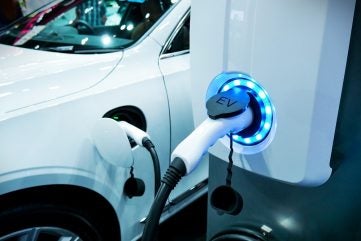
The UK Chancellor of the Exchequer Jeremy Hunt has made his Budget statement to the House of Commons, but the UK’s auto industry has been left disappointed by the lack of any new incentives for the purchase of electric cars.
The Budget outlines the state of the economy and the Government’s proposals for changes to taxation.

Discover B2B Marketing That Performs
Combine business intelligence and editorial excellence to reach engaged professionals across 36 leading media platforms.
In this year’s Budget, it was announced there would be no increases in fuel duty for the next 12 months, with Mr Hunt confirming the extension of 5p per litre cut on petrol and diesel.
This is the 14th year in a row that fuel duties have been frozen, which will save drivers around £50 a year.
However, many auto industry figures were disappointed by the abscence of supporting private EV sales through VAT and Vehicle Excise Duty (road tax) cuts.
Vauxhall: “We cannot drive demand alone”
British brand Vauxhall, which is owned by Stellantis, is among some leading industry voices calling on the government to introduce incentives to stimulate EV adoption. It also announced it supports the FairCharge campaign for a fairer taxation on charging.
James Taylor, Managing Director, Vauxhall, commented: “Today’s Spring Budget has not delivered the acceleration needed to stop the UK’s transition to electric vehicles from stalling.”
“If we are to meet the rightly ambitious targets laid out in the Government’s Zero Emission Vehicle mandate (80% of all cars sold to be electric by 2030) then there needs to be incentives for private car buyers to make the switch to electric as there are in the majority of European nations.
“Vauxhall will already offer its entire car and van line-up as electric by the end of this year and has a number of highly competitive offers available but we cannot drive demand alone.
“Whilst there are strong incentives for company car drivers to make the switch to electric – including for those choosing luxury vehicles – the private buyer who wants a more attainable small or family car receives nothing.
“We would call on the Chancellor to urgently set up purchase incentives to stimulate the electric vehicle market and review the unfair taxation on public charging so that the UK isn’t left behind in the race to more sustainable motoring.”
SMMT: “A missed opportunity”
One of the UK’s largest trade associations, the Society of Motor Manufacturers and Traders (SMMT) also weighed into Mr Hunt’s announcement.
In the UK, automotive-related manufacturing contributes £78 billion turnover and £16 billion value added to the economy, and typically invests around £3 billion each year in R&D.
Mike Hawes, SMMT Chief Executive, said: “Government has been keen to assure the UK automotive industry’s competitiveness, with support for EV development and manufacturing – including £2.1 billion in autumn’s Advanced Manufacturing Plan – but there is little to help consumer demand.”
“Today’s Budget is, therefore, a missed opportunity to deliver fairer tax for a fair transition. Reducing VAT on new EVs, revising vehicle taxation to promote rather than punish going electric, and an end to the VAT ‘pavement penalty’ on public charging would have energised the market.
“With both Government and industry having statutory requirements to deliver net zero, more still needs to be done to help consumers make the switch.”
EO Charging: “Disappointing”
EO Charging, a British provider of technology-enabled charging solutions for EV fleet,s called for government grants to be made available to help the public – particularly those on low-incomes who might not be able to afford EVs – access zero-emission transport, such as buses.
Charlie Jardine, CEO of EO Charging, said: “Achieving net zero is one of the most significant and crucial aims of the Government in history.”
“One of the most important elements to achieve this is transitioning to Electric Vehicles (EVs) since transport is responsible for almost a quarter of global emissions, with commercial fleets accounting for a large proportion of this. Incentivising citizens and commercial fleets to switch to EVs is a critical step in the government’s net zero strategy.
“It is therefore disappointing not to see a VAT cut on EVs as part of the Spring Budget announcement, as we believe this would have helped increase the uptake of EVs.
“Many Governments worldwide have introduced policies and incentives to encourage EV adoption. As well as tax incentives, these include subsidies for purchasing electric buses, grants for building charging infrastructure and mandates for transitioning to zero-emission fleets.
“However, there is a widespread perception that EV incentives primarily benefit affluent private EV owners. To ensure equal access to electric vehicles, the Government should also consider measures that benefit a wider cross-section of the public, for example grants for charging infrastructure and mandates for zero-emission bus fleets.
“This would help support those on lower incomes who may not be able to own an EV, but who should not be missing out on the environmental and health benefits of electrification.”






